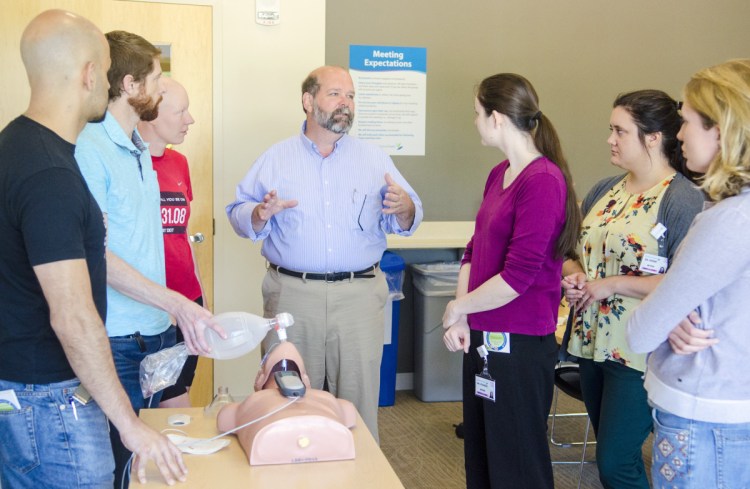AUGUSTA — Maine emergency medical service officials have decided to more broadly share information about the care patients receive following recent legislation and the recommendations of physicians who oversee the system.
Physicians say the change will improve their ability to assess how patients are being treated across the state’s emergency service regions.
Even so, some officials have insisted that precautions be taken to make sure patients’ privacy is not violated, while some providers have objected to the information about their calls being shared without their permission.
“I’m always concerned about individuals’ protected medical information,” said Shaun St. Germain, the director of the state EMS office. “We’re always wary of it being misused or misappropriated. There is no indication that has happened or will happen in the future, but that’s why we have the safeguards in place that we do.”
For decades, people who oversee Maine’s emergency medical system have used data collected on every ambulance trip to identify and address problems in the system.
But there have been changes in the way that state officials collect, store and release the data that’s collected by rescue services.
Last summer, officials still were getting used to a new online program for collecting data when they realized they didn’t have the legal authority to release it for quality improvement purposes.
TAKING BACK ACCESS
Under the state law governing emergency medical services, any medical data that identify patients could be released only with the approval of three agencies, and for the specific purposes of research, public health surveillance or linking with other medical records.
Katie Johnson, an assistant attorney general, provided that legal opinion to the state office of emergency medical services last year. Soon thereafter, the office stopped releasing that information to the regional staff.
Only now, after months of lobbying, are Petrie and other regional officials close to regaining access to that medical information.
Last spring, they successfully urged state legislators to change the law that governs Maine’s emergency medical services, creating an exemption for it to be released on quality improvement grounds. That bill, L.D. 1735, survived a veto by Gov. Paul LePage.
Then, in June, two state boards also granted their approval. Now St. Germain has completed guidelines for how the access can be restored.
The old arrangement can’t return soon enough, according to regional officials such as Petrie and physicians who rely on them. Both of those groups say the information is important for improving medical care, while emphasizing that they have always been careful to protect the identities of patients.
In Maine, emergency medical services are overseen by several groups, including the state office and a set of supervisory boards. They’re also overseen by physicians who serve as medical directors in six regions, along with organizations that receive state funding to support the regions.
Petrie works for Atlantic Partners EMS, an organization that assists four regions: southern Maine, the Kennebec Valley, the midcoast, and a fourth region stretching from Down East to Penobscot and Piscataquis counties.
The other two regions – Aroostook County and a set of three counties in western Maine – have their own staffs.
MONITORING SERVICES
While medical directors legally have been allowed to access patient data all along, they argue that regional staff members are critical to helping them pull it out of the state’s complicated data management system. Besides having technical expertise with the software, those staff members also have more time than physicians to look at the data and search for ways to improve the work of emergency responders, they say.
“If I think I see a pattern through a region, as a medical director, I can say, ‘I need some help here. … Can you run a report for me?'” Timothy Pieh, a physician at MaineGeneral Medical Center who serves as medical director in the Kennebec Valley region, said during a June 6 meeting of the Maine Board of Emergency Medical Services,
The Maine Board of EMS is a group of providers appointed by the governor that controls many operations of the rescue system.
By reading those reports, Pieh went on, he can discover important patterns in care, such as a spike in the number of intubations that have been performed by an individual service.
But, he continued, “You need full disclosure to do these things. … I personally don’t have an IT skill set that lets me create those reports.”
Eventually, the Maine Board of EMS voted to grant access to that data for quality improvement efforts, which will allow a limited number of regional staff members to use it.
All but three of the roughly 16 board members present at a June 6 meeting voted to restore that access, and numerous people spoke in favor of the proposal. Just two board members voted against re-approving the access, while a third abstained.
But a few board members did raise questions and concerns.
The board chairman, Caribou Fire Chief Scott Susi, questioned the need for the regional staff to get blanket approval from the state when individual rescue services also have the authority to grant access to their reports.
In response, Petrie said that some services were not willing to grant that access. He also said that having universal access to that information through the state – as they did for many years leading up to the changes last summer – improved his ability to find information about individual complaints and work with providers to address them.
Charles Eichacker can be contacted at 621-5642 or at:
ceichacker@centralmaine.com
Twitter: @ceichacker
Send questions/comments to the editors.




Comments are no longer available on this story